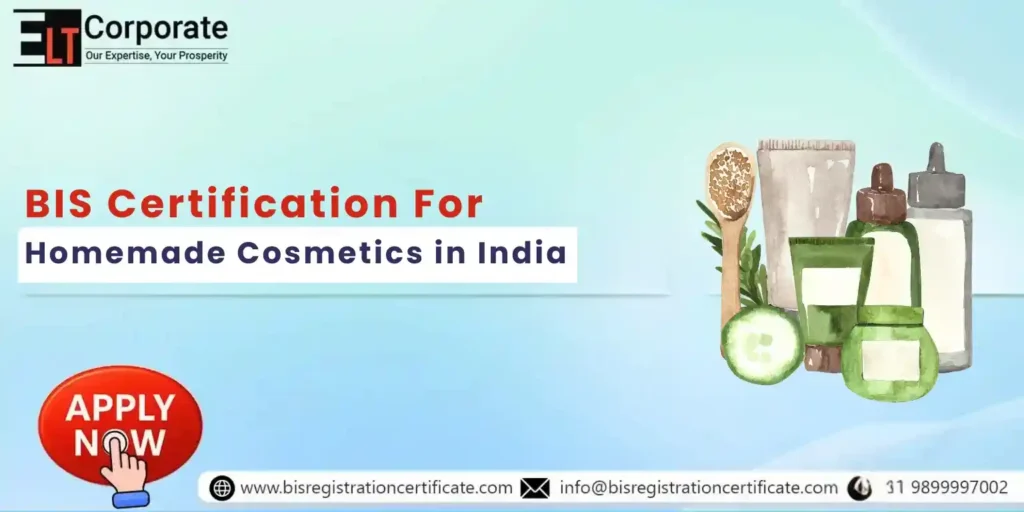The cosmetic market in India demonstrates an increasing consumer preference for natural homemade beauty products which are free from chemicals and hand-crafted. Manufacturers need to meet Bureau Of Indian Standards certification requirements for selling their products legally and to certify that their products adhere to safety standards and quality and hygiene protocols. BIS certification protects your homemade cosmetics from harmful ingredients while building consumer confidence and expands your market reach and protects your business from regulatory sanctions.
In this blog, we are going to read about what BIS certification is, why it is important for homemade cosmetics, and how you can obtain it step by step.
What is BIS Certification?
The Bureau of Indian Standards operates as India’s official standards authority which establishes product quality standards together with safety and reliability standards. BIS develops IS standards that determine safety standards and composition requirements together with labeling guidelines and packaging standards for cosmetic products.
The Drugs and Cosmetic Act 1940 and Cosmetics Rules 2020 require mandatory BIS certification for specific cosmetic product categories. Food products that lack appropriate certification will face legal consequences when sold in markets regardless of their homemade nature.
Why is BIS Certification for Homemade Cosmetics Is Important?
Below we mentioned why is BIS certificate for homemade cosmetics is important:
- Legal Compliance – Avoid penalties and ensure your business meets all regulatory requirements.
- Consumer Trust – BIS mark on your cosmetics builds credibility.
- Quality Assurance – Ensures products are safe and free from harmful ingredients.
- Market Access – Retail chains, e-commerce platforms, and export markets often require certified products.
Which Homemade Cosmetics Requires BIS Certification?
While not all cosmetics need BIS certification, products falling under specific Indian Standerds must comply, Some example include:
- Skin Creams & Lotions – IS 6608:2004
- Lipsticks – IS 9875:1990
- Face Powders – IS 3959:2004
- Hair Oils – IS 7123:1993
- Shampoos – IS 7669:1990
- Toothpaste – IS 6356:2001
Step-by-Step Process for BIS Certification of Homemade Cosmetics
Below we mentioned Steps to obtain BIS Certificate for homemade cosmetics:
1. Identify Applicable Standards: Check BIS’s database to find the IS standard relevant to your product type.
2. Prepare Your Manufacturing Setup
- Ensure your production area meets hygiene requirements.
- Install proper equipment for mixing, filling, and packaging.
- Maintain clean storage for raw materials.
3. Conduct Product Testing
- Submit samples to a BIS-recognized laboratory.
- Testing will cover safety, composition, and physical properties.
4. Apply to BIS
- Fill the BIS application form online (Manakonline portal).
- Upload documents like:
- Proof of business registration
- Product formula with ingredient list & percentages
- Manufacturing process details
- Packaging & labeling samples
- Test reports from BIS-approved lab
5. Factory Inspection: BIS officer will visit your manufacturing unit to verify compliance.
6. Certification & Use of ISI Mark: Once approved, you will receive a BIS license allowing you to use the ISI mark on your homemade cosmetic products.
Cost & Validity of BIS Certification
Application Fee – ₹1,000–₹2,000 (Changes by product category)
Testing Fee – ₹5,000–₹15,000 (Trust on test parameters)
License Fee – ₹1,000 per year (approx.)
Validity – 2 years (renewable)
Key BIS Standards for Cosmetics
| Product Type | BIS Standard Code | Description |
|---|---|---|
| Skin Creams & Lotions | IS 6608:2004 | Safety & quality specifications |
| Lipsticks | IS 9875:1990 | Pigment, lead, and heavy metal limits |
| Hair Oils | IS 7123:1993 | Viscosity, purity, and contamination limits |
| Shampoos | IS 7669:1990 | Foam stability, pH, and ingredient limits |
| Toothpaste | IS 6356:2001 | Fluoride limits, texture, and packaging |
Tips for Homemade Cosmetic Entrepreneurs
- Maintain Proper Records – Keep components buy receipts, batch records, and quality checks.
- Label Correctly – Include product name, manufacturer details, MRP, batch number, expiry date, and components.
- Stay Updated – BIS periodically updates standards; keep track of changes.
- Test Regularly – Even after certification, conduct regular quality checks to maintain compliance.
How ELT Corporate Can Help
At ELT Corporate, we specialise in BIS Certification for Homemade Cosmetics in India, including power banks. We offer:
- End-to-end application support
- Testing coordination with BIS labs
- Documentation & portal filing
- Post-certification compliance advisory
Conclusion
Each Indian cosmetic company needs to get BIS certification because it serves both as a mandatory regulation and an assurance of product quality. Obtaining the proper certification system allows you to safeguard
Our team at ELT Corporate provides complete guidance for BIS certification of homemade cosmetics starting from documentation preparation to obtaining final approval.
Is BIS certification mandatory for homemade cosmetics in India?
Yes, if your homemade cosmetics fall under the BIS compulsory certification list, you must obtain BIS certification before selling.
Which homemade cosmetics require BIS certification?
Products like skin creams, shampoos, and soaps listed in BIS standards require certification for legal sale in India.
Can I sell homemade cosmetics without BIS certification?
Only if your product is not in the BIS mandatory list; otherwise, certification is compulsory.








